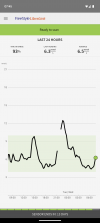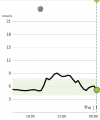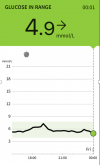Gloaming
Member
- Messages
- 14
- Type of diabetes
- Don't have diabetes
- Treatment type
- I do not have diabetes
Hi all,
I'm still trying to further my understanding around the mechanics of insulin production and glucose levels. Rather more specifically, how it relates to me!
I am not diagnosed with diabetes or even pre-diabetes. My hba1c was 33 in February. What I've learnt though, is that I don't handles carbs well.
I attached yesterday's libre graph. Lunch was a palm sized jacket potato with butter and cheese (30g carbs). Dinner was pizza (80g carbs).
At present it doesn't appear to be causing a problem, although I do have mild symptoms when my BG goes to either extreme.
Clearly I don't have prediabetes so my concern isn't about that. I guess I'm trying to establish whether this is actually a really common issue and so long as I manage my diet all will be fine?
I don't understand the mechanics enough to be able to make sense of the data I have!
I'd be grateful for your thoughts and/or explainations of what's happening here.
(My GP is useless, even if I could get an appointment, I very much doubt she'd be of any use so I figure I'd ask the patient experts. )
)
I'm still trying to further my understanding around the mechanics of insulin production and glucose levels. Rather more specifically, how it relates to me!
I am not diagnosed with diabetes or even pre-diabetes. My hba1c was 33 in February. What I've learnt though, is that I don't handles carbs well.
I attached yesterday's libre graph. Lunch was a palm sized jacket potato with butter and cheese (30g carbs). Dinner was pizza (80g carbs).
At present it doesn't appear to be causing a problem, although I do have mild symptoms when my BG goes to either extreme.
Clearly I don't have prediabetes so my concern isn't about that. I guess I'm trying to establish whether this is actually a really common issue and so long as I manage my diet all will be fine?
I don't understand the mechanics enough to be able to make sense of the data I have!
I'd be grateful for your thoughts and/or explainations of what's happening here.
(My GP is useless, even if I could get an appointment, I very much doubt she'd be of any use so I figure I'd ask the patient experts.




